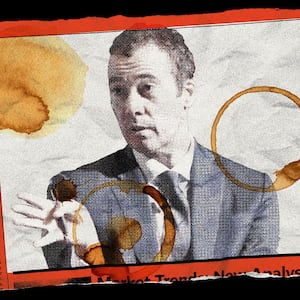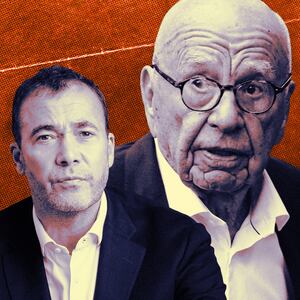Will Lewis, the dashing British journalist and publishing executive, rode into the Washington Post’s newsroom in January like a white knight. As the Post’s new publisher, Sir Will—yes, he has a knighthood—quickly charmed the storied paper’s staff with self-deprecating wit and a firm grasp of the organization’s challenges. A new era seemed to be afoot. Last month, Lewis began the first phases of an ambitious restructuring of the Post‘s business and editorial operations.
In little more than a week, the goodwill has dissipated.
First, there was the stunning news that Lewis had pushed out the Post’s editor, Sally Buzbee, smack in the middle of a presidential campaign. Her replacement: two of Lewis’ former colleagues, neither of whom had ever worked at the Post. Then came stories from The New York Times, NPR, and the Post itself that suggested Lewis had tried to manipulate news reporting about his role in cleaning up the phone-hacking scandal at Rupert Murdoch’s British tabloids more than a dozen years ago (the scandal is the subject of an ongoing lawsuit; Prince Harry, and other plaintiffs, allege Lewis helped conceal evidence. Lewis has denied wrongdoing).
As he continues remodeling the Post—a project he’s dubbed “Build It”—Lewis has been hosting staff Q&As, known internally as “Say It” sessions. After last week’s events, here are a few things staff members might want to say and questions they might want to ask:
1. You issued a staff memo on Friday acknowledging the need for greater humility on your part. Yet you didn’t offer an apology for your role in any of the episodes reported last week. Do you feel one is necessary?
In his memo, Lewis wrote, “I need to improve how well I listen and how well I communicate so we all agree more clearly where urgent improvements are needed and why… I know trust has been lost because of scars from the past and the back-and-forth from this week. Let’s leave those behind and start presuming the best of intent.”
2. Was it proper for you to offer any advice or guidance to Sally Buzbee when she informed you in March and May that the Post intended to publish news stories about your earlier work for Murdoch? Do your alleged efforts to dissuade Buzbee from publishing these stories represent a conflict of interest?
As reported by the Times and Post, Buzbee approached Lewis to alert him about the upcoming stories. He reportedly told her the topic didn’t warrant coverage. When Buzbee responded that she intended to go ahead with the stories, Lewis accused her of “a lapse in judgment,” the Times said. Lewis has denied pressuring Buzbee or using that reported phrase.
3. How many people did you interview before you hired Matt Murray and Robert Winnett as the new editors of the Post? Were any internal candidates interviewed? Any women or people of color? If not, why not?
Post journalists were critical of Lewis’ hiring decision in an all-staff meeting last Monday, the day after what was apparently a hastily prepared announcement of Buzbee’s ouster. Murray, the former editor of the Wall Street Journal, will be the Post’s interim editor. After Election Day, he will move into a new role and be succeeded by Winnett, currently the deputy editor of the British Telegraph newspaper with his own colorful background.
4. Why did you feel the need to replace Sally Buzbee, especially now? Do you believe that she bears responsibility for the decline in subscriptions, traffic, and revenue? Did you feel she was incapable of leading your editorial restructuring? Other than your history of working with them, why do you feel Murray and Winnett are more capable?
At the Monday staff meeting, Lewis, clearly exasperated with a barrage of questions, responded at one point, according to the Post, “We are going to turn this thing around, but let’s not sugarcoat it. It needs turning around. We are losing large amounts of money. Your audience has halved in recent years. People are not reading your stuff.”
Lewis’ peevish response may imply that the Post’s journalists bear responsibility for the decline in readership. But as an experienced news manager, Lewis is surely aware that the Post’s losses aren’t entirely unusual; many publishers have seen their traffic fall. This secular decline has been driven by multiple factors, some of them beyond any editor’s or news organization’s control, such as news “fatigue,” changing referral algorithms, and increased competition, including from social media.
5. It’s likely that very few people at the Post, or even in Washington at large, knew Robert Winnett’s name before you announced him as the Post’s next editor-in-chief. Clearly, you believe he is capable and qualified, but why should we believe that a journalist who has spent little time in Washington or America and has never run an organization as large and complex as the Post, is the person best qualified to direct the news coverage of the leading newspaper in the nation’s capital? Why do you think he has never been asked to helm a British newspaper?
In a staff memo last Sunday following Buzbee’s resignation, Lewis wrote that Murray and Winnett are “excellent people as well as world class editors.” Murray was introduced to the staff in a meeting on Monday; Winnett hasn’t been spotted at the Post yet and Lewis hasn’t offered further details.
6. Winnett is most famously associated with the Telegraph’s investigation of expense-account abuses in the U.K. Parliament, reporting based largely on a database that the newspaper acquired by paying a source about $140,000. Do you believe the means justified the ends in that instance? Will you pay for stories at the Post, or renounce the practice?
The Daily Telegraph’s expense account series in 2009 was a blockbuster in Great Britain, leading to investigations, resignations, and criminal charges against some members. Lewis was editor of the Telegraph at the time and was named “journalist of the year” for the stories; Winnett was a deputy who supervised a team of reporters who vetted the material. British publishers have sometimes paid for major scoops (although other British publications turned down the expense leak). Some journalists criticized the Telegraph for “checkbook journalism.” The practice is widely frowned upon by mainstream American journalists, who consider it unethical.
7. You’ve spent a good deal of your career working for news organizations owned by conservative figures, including Rupert Murdoch. Will you commit to preserving the Post’s tradition of political neutrality in its news coverage?
Lewis, 55, began his career as a financial reporter for the Mail on Sunday and later joined the London-based Financial Times (his big scoop was breaking the news of Exxon’s merger with Mobil in 1999). He later became editor at the Telegraph, a center-right daily. Following his work for Murdoch’s British papers in Great Britain, Lewis became CEO of the Murdoch-owned Dow Jones & Co., parent of the Wall Street Journal, serving from 2014 to 2020. But Lewis has never publicly aligned himself with a political party, espoused political causes, or suggested the Post should abandon its reporting traditions.
8. When was the last time you communicated with Jeff Bezos? Have you had any discussions with him about the developments of the past week? Has he expressed support for you?
Bezos, in typical fashion, hasn’t said a word about his new publisher. Lewis hasn’t commented on his boss, either.
(Bonus question: When did you last speak with your former boss Rupert Murdoch?)
9. You’ve said you spoke off the record with NPR reporter David Folkenflik late last year when he asked for an interview. But you haven’t denied that you offered him an exclusive interview in exchange for dropping a story about the hacking scandals, as he reported last week. Do you deny that you made such an offer?
Lewis offered no clarity on the matter on Thursday. He told the Post he had an off-record conversation with the reporter in November before he assumed his duties as publisher. But he didn’t specifically refute Folkenflik’s claim that he offered an interview only if NPR agreed to drop his reporting about Murdoch and hacking. Folkenflik never got an interview with Lewis; he published his hacking story in December.
10. You described Folkenflik as “an activist, not a journalist.” What activism do you believe Folkenflik was engaged in? Further, isn’t calling a well-respected reporter an “activist” disrespectful to your own journalists, who, like Folkenflik, attempt to engage sources every day in pursuit of accurate information?
Lewis made the comment in a Post story published on Thursday but did not elaborate.
11. You’ve announced the creation of a “third newsroom” for “service and social-media journalism.” How many people will work for it? What is “service and social-media journalism”? Given its apparent importance in your overall plan, why have you offered so few details about it since announcing it?
This is a black box in Lewis’ restructuring plan. It’s mostly a mystery. What is known: Lewis has appointed Murray to oversee this new entity, starting in November. Until then, he’ll serve as interim editor-in-chief, after which Winnett will succeed him. Why is Murray—an accomplished editor but not one closely associated with “service and social-media journalism”—the best man for this new job? That, too, is a mystery.
12. Given the upheaval of the past week, morale in the newsroom and confidence in you personally have fallen. What can you do or say to restore trust and increase the “buy-in” for your restructuring plan?
Over to you, Sir Will.








